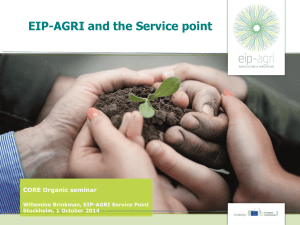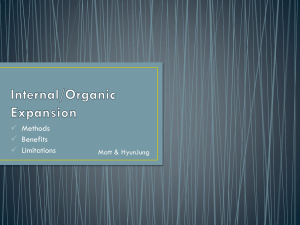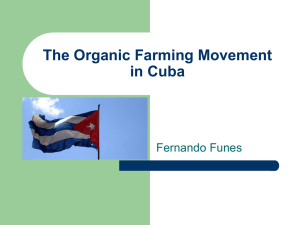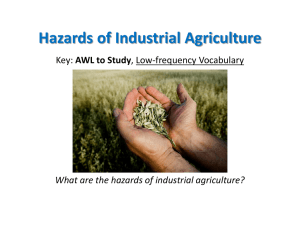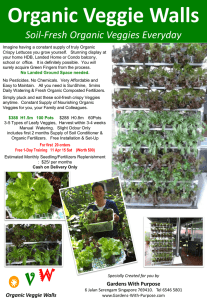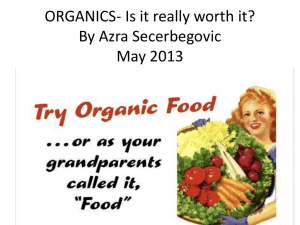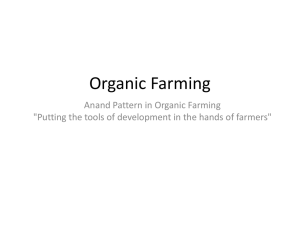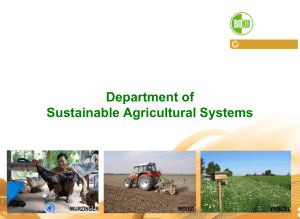By Erin Gordon Organic Farming
advertisement
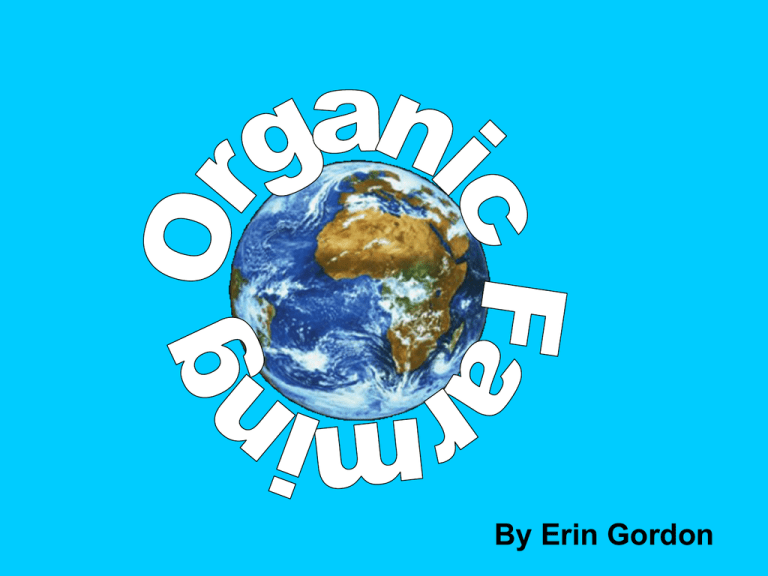
By Erin Gordon • It is an agricultural method that promotes the use of natural fertilizers, pesticides, fungicides and animal feed. • In addition, it is the practice of crop rotation and the introduction of “beneficial pests” to maintain soil productivity. • Farmers also add natural materials like compost and minerals to increase soil health and ensure a good yield. http://www.youtube.com/watch?v=lexXYzLQwDo To be classified as “Certified Organic” a farmer must ensure his crops meet the standards of the COABC or the Certified Organic Associations of British Columbia in BC. This can include: • Treating animals in a humane way • Using quality composts • Producing food with no synthetic colours or flavours A lot of research has been done about the effects of organic Farming. So what are some of the positives? • Organically grown food may be healthier. A study done by researchers at California of University, Davis, has found that food produce by organic methods contain up to 58% more polyphenolics (an antioxidant) than conventionally produced food. The researchers concluded that the higher levels of polyphenolics, which plants use as a natural defense system, could be attributed to the greater amount of pests they must fight. This is another way of saying that pesticides and herbicides could be lower a plants rate of phenolic production. • It’s Good for the environment too! One of the main reasons for farming organically is to protect and maintain the health of the soil. To do this farmers use nutrient-rich composts that contain only organic materials, they add minerals like rock phosphate and greensand and they practice crop rotation. The use of GMOs or Genetically Modified Organisms is a controversial topic. Organic farmers do not use them, but they are a trend in many large argicultural sectors. Not only are GMOs unnatural, but they have been linked to excess leeching of soil nutrients which may cause soil degradation and ultimate desertification. Water is another has become a big issue lately. Because no chemicals are used in organic farming, the possible groundwater contamination is nonexistent. • It’s good for the economy Agriculture is a major industry in Canada. Organic farming, though much more specialized holds plenty of financial benefits. • large opportunity for rural jobs. • less external costs for unnecessary pesticides, fertilizers, etc. • It removes the need for reversing the effects of soil degradation. • The damaging effect of chemicals from agricultural practices on people’s health may be expensive in the long run. Organic farming alleviates that possibility. There has been a lot of talk about the benefits of organic farming, but what are some negatives? • It might not be sustainable/profitable Many studies conducted on organic farming have concluded that the yields provided are not productive enough to be profitable. One such study was done in Switzerland over a 21 year period. The researchers found that organic yields were 20% lower than those of conventional farming. With projections of a massive population increase over the next few decades, food production is going to be a hot-button issue. If organic farming cannot meet the demand, is there any point? • Is organic worth the steep price? The cost of a conventionally grown 5lb bag of red grapefruits is $3.00 at Save-On. At the same store you can purchase only 3 organic red grapefruits for $2.00. This price seems ridiculous when many studies have shown that regular fruit is just as nutritious as organic. • Organic food has become a status symbol • In our current economic crisis, is it really worth it? • Organic agricultural practices are a promising method that will hopefully be expanded in the near future. •The benefits of buying, eating, and producing organically well out weighs the negatives • The price may be a factor in deciding to buy organic but the health of our soil should be more important. • In our environmentally conscious world, people need to be more informed about how their food is produced and what effects that is having on the earth and our futures. Bibliography Information – – – – – – http://en.wikipedia.org/wiki/Organic_farming http://newscientist.com/article/dn12245 www.ats_sea.agr.gc.ca/canada/e3468.htm www.certifiedorganic.bc.ca www.news.ucdavis.edu/search/news_detail.lasso?id=6312 http://longhaulfarm.com/organicfarm.php Pictures • www.cartoonstock.com/newscartoons/cartoonists/mba/lowres/mban7871.jpg • www.sweetwheat.com/userfiles/image/cat-usda2.png • www.bbc.co.uk/media/images/3817000/jpg/_38170507_wheat300.jpg • www.tw3o.com/wp_content/uploads/money-tree.jpg

